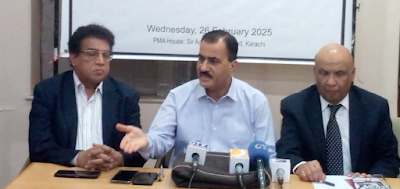Pakistan's healthcare system reaches breaking point, PMA warns
Pakistan's premier medical body fears devastating consequences of neglecting public health, calls for immediate action
IV Report
KARACHI: The Pakistan Medical
Association (PMA) launched its annual report, "Health of the Nation,"
at a press conference on February 26. The report reiterates that the overall
disease-prevention style and patient-care system have not been yielding
positive results for long. If stronger, foolproof rectifying measures are not
taken immediately, it may lead to devastating consequences and further
embarrassing Pakistan's position among the comity of nations.
The PMA 2025 report presents a stark
picture of a system in dire need of reform. It emphasizes the need for
immediate and decisive action from federal and provincial governments to
address pressing health challenges. The report calls for stronger healthcare
policies, improved access to medical resources, and a healthier,
socio-economically excelling Pakistan for all.
The PMA's concerns include the surge
in polio cases, rising numbers of hepatitis and HIV cases, and inadequate
treatment provisions. Responding to questions from media persons, PMA leaders
candidly acknowledged the lack of meaningful monitoring and evaluation, as well
as the absence of real-time diseases-data and information dissemination.
According to the PMA, many public
health aspects remain untouched due to the lack of sound strategy and
subsequent actions. The PMA (Central) Secretary General, Dr Abdul Ghafoor
Shoro, Dr Shahid A Sami, Chairman of the editorial board of JPMA, and Dr Ameer
Muhammad Solangi, Editor of PMA Medical Gazette, addressed the press
conference.
They highlighted the continued increase in the country's population size, with a demand that the family division ministry or departments should work independently under separate leadership and a dedicated cadre of employees.
Dr Shoro stated that Pakistan, along
with Afghanistan, hosts the paralysis-causing virus among children, with a
surge in new polio cases from 6 in 2023 to 74 in 2024. The related
interventions and strategies on the ground are not leading to success, instead
earning embarrassment for the country. He doubted that the total number of
polio infections detected across the country was not true, as many cases remain
unreported.
He continued that polio eradication
and control measures are on the verge of collapse due to severe governance
issues. "We need to address the root causes first, followed by daring and
dedicated efforts," he added.
Dr Shoro further stated that Pakistan
faces a significant HIV/AIDS challenge. The National Aids Control Program reports
72,515 registered HIV cases, while UNAIDS estimates a total of 297,052
individuals living with HIV. "Despite these alarming figures, only 46,991
patients are currently receiving treatment in government facilities, while
little is known about the behavior and style of life of the unreached peoples
living with HIV or those who are not reporting to the so-called prevention and
control network for follow-ups and counseling."
Highlighting the public health and
population crisis, the PMA secretary emphasised that maternal and newborn child
nutrition remains a major health concern in Pakistan, affecting maternal
health, infant survival, and development. "Around 14% of pregnant women
are undernourished, and 42% suffer from anemia, increasing risks of complications
and low birth weight," while deficiencies in calcium, vitamin D, and
protein further harm maternal health.
Dr Shoro stated that mental health
disorders account for over 4% of the total disease burden in Pakistan, with
women being more affected. "Around 24 million people need psychiatric
assistance, and depression affects 44% of the population (57.5% in women and
25% in men), on the other hand, mental health resources are severely lacking,
with only 0.19 psychiatrists per 100,000 people."
He expressed concern over inadequate
access to clean drinking water, stating that contaminated water accounts for
40% of annual deaths in Pakistan, surpassing fatalities from terrorism and
natural disasters. "Poor water quality is responsible for nearly 30% of all
diseases nationwide. Immediate investment in water purification and sanitation
infrastructure is imperative to prevent avoidable illnesses and deaths."
Dr Shoro called for urgent
initiatives for early cancer detection, improved treatment accessibility, and nationwide
awareness campaigns to reduce mortality rates and improve patient outcomes.
Dr Shahid Sami discussed
cardiovascular diseases (CVD) and stated that they pose a grave health risk.
CVD is one of the leading causes of mortality in Pakistan, calling for
preventive measures, doing away with tobacco smoking, lifestyle changes, and
affordable treatment options on a priority basis to combat this growing
epidemic.
Regarding quackery and patient grievances, Dr Shoro remarked that healthcare commissions, including the SHCC in Sindh, were not performing up to the mark. SHCC is also proving an ineffective body, faced with many laws and rules' execution issues, he noted.
PMA has called on the government to
take immediate action to strengthen the healthcare system. It recommends
several key measures:
- Enhance access to medical
resources, particularly in rural and underserved areas.
- Develop and implement effective
healthcare policies to address the country's specific health challenges.
- Increase the number of healthcare
professionals, including doctors and nurses, to ensure adequate staffing in
hospitals and clinics.
- Invest in preventive healthcare
measures, such as vaccinations and health screenings.
- Upgrade public health
infrastructure, including hospitals, clinics, and laboratories.
- Strengthen immunisation programmes
to prevent the spread of infectious diseases.
- Improve medical education, tackle
specific health challenges, and strengthen governance and accountability within
the healthcare system.
- Develop strategies to mitigate the
impacts of environmental and climate change on public health.






Comments
Post a Comment